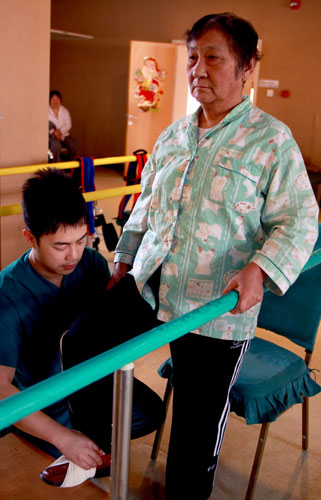Society
No country for Alzheimer's patients
Updated: 2011-03-22 07:43
By Li Li (China Daily)
Private homes step in
"You need to have either money or connections to get into the State-owned nursing homes," said Zhou Yue, who owns Fushoukangle Elderly Home, a private nursing home in a residential complex in Harbin, Heilongjiang province in Northeast China.
After being laid off from a plastic production factory, Zhou bought two apartments and started to recruit elderly people from within the compound in 2006. Twenty old people, three of them with Alzheimer's, stay in her 140-square-meter nursing home.
Zhou estimated more than 100 private nursing homes operate in Harbin, compared with five owned by the State.
"Private nursing homes have shouldered a major part of the country's elderly burden," said Zhang Minsheng, owner of Minsheng Geracomium in Shanghai, one of the city's earliest and biggest private nursing homes.
|
|
Officials from the local civil affairs department and police station pay regular visits to registered nursing homes, so the quality of the illegal ones can't be guaranteed.
"An illegal private nursing home within the same compound as mine doesn't even bother to clear the excrement that Alzheimer's patients smeared on the wall, and its neighbors have complained repeatedly to the police about the bad smell," said Zhou, of Harbin. "At least my nursing home doesn't smell."
Risks and barriers
When private nursing homes reject people with dementia, a key reason is the high risk of lawsuits. Just one example: In May 2010, an old man choked to death while eating alone in a Shanghai nursing home. His family sued the home, asking 380,000 yuan in compensation. The court awarded the family 150,000 yuan.
But what frightens Zhang and owners of other private nursing homes most are the unthinkable things Alzheimer's patients can do to themselves.
"I've had old people who tried to jump from the balcony of high buildings," Zhang said. "And when I tried to build bars around Alzheimer's patients' beds, the police blamed me for illegal captivity."
According to recent statistics from China Aging Development Foundation, most incidents with serious consequences in nursing homes involved Alzheimer's patients.
No specific regulation in Chinese law clearly sets forth a division of responsibility in nursing home accidents. As a result, many private nursing homes simply shut the door on high risk - and many Alzheimer's patients are confined at home, or worse.
"I once visited a mental hospital in Beijing, and I found most of the elderly patients there were actually Alzheimer's patients, yet they were chained to the chairs and treated as if they had schizophrenia or other psychological diseases," said Professor Tian Jinzhou, director of the Neurology Center at Beijing University of Chinese Medicine and vice-president and chief physician of Beijing Dongzhimen Hospital.
Specials

'Super moon'
The "Super Moon" arrives at its closest point to the Earth in 2011.

Radiation test
The probability of being exposed to a life-threatening level of radiation is quite slim.

Panic buying of salt
Worried Chinese shoppers stripped stores of salt on radiation fears.
